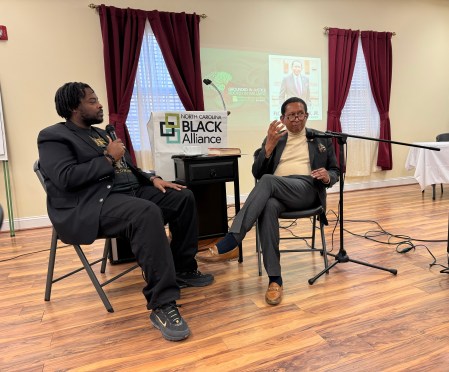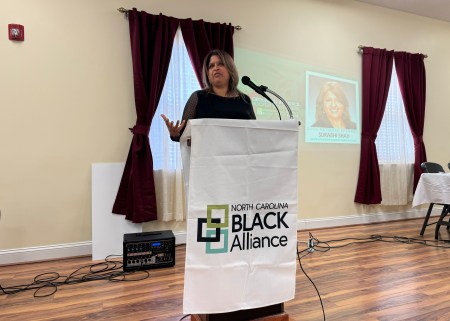Community activists often don’t have the luxury of working on one problem at a time — environmental, political and health care issues, for instance, often arrive on their doorstep bundled together.
“The same areas that are impoverished, the same areas that have these environmental issues, have low political turnout,” said Marcus Bass, executive director of Advance Carolina, a political and economic advocacy group.
The smorgasbord of problems facing affected communities requires a collaborative approach, activists say.
The challenge of everything, everywhere, all at once was explored in a meeting, which took place recently in Whitakers, in Edgecombe and Nash counties. The event, “Grounded in Justice, Rooted in Wellness: Environmental Injustice Healthcare Summit,” was organized by the North Carolina Black Alliance, a nonprofit group that works to strengthen Black and brown communities through economic advancement, health and wellness, and political advocacy.
About 60 community advocates, environmentalists, health care providers, faith leaders, state politicians and an EPA representative spent the day dissecting issues affecting low-wealth Black and brown communities — and charting a pathway forward.
For instance, activists continue to battle to hold industrial giant Chemours accountable for polluting the Cape Fear River with per- and polyfluoroalkyl substances (PFAS) and threatening the health of people who live in the river basin.The silver lining is that new PFAS standards from the EPA are expected soon.
The activists also examined the fight against concentrated agricultural feeding operations (CAFOs) in eastern North Carolina and the GFL Sampson County Landfill. Both threaten the health and quality of life for Black and low-wealth residents who live nearby.
In the political and health arenas, voting rights advocates filed a federal lawsuit in 2023 to combat what critics say is the legislature's attempt to weaken the Black vote by gerrymandering. In the U.S., Black infant mortality rates, according to the CDC, were the highest among all groups at 10.6%, underscoring the health disparities that exist in the Black community.
As some activists and researchers say, these issues don’t happen in a vacuum. Often they intersect and are rooted in the past.
Recurring themes
“When they put that landfill in Warren County, it was a poor county — probably among the top three [poorest] in North Carolina," McKissick said. "It was about 68% Black, and they did not have the political clout and power you might have had in an urban area today."

"Today, the conversation has changed somewhat from what it would have been 30 or 40 years ago when you're talking about, [for instance], the PCB landfill being established in Warren County," Floyd McKissick Jr., attorney, former North Carolina state senator (2007-20) and member of the N.C. Utilities Commission, shared with NC Health News.
“The state has been conditioned to some of these areas being desolate and destitute, you know, they are the dumping grounds of North Carolina,” Bass said.
“PFAS, forever chemicals have become a buzzword," said state Sen. Natalie Murdock (D-Durham). ‘It's something we're talking about all the time.”
She also said we must be vigilant because the cumulative effects of all these environmental insults are plaguing communities.
“These communities are already being impacted by climate change, by years of disinvestment and gerrymandering,” Murdock said during a panel discussion. “You don't have representatives that even care about these issues, quite frankly, they just want to ignore them and sweep them under the rug.”
'Moving the needle'
The range of issues Murdock and others identified require collaboration of agencies and community leaders to address the needs of under-resourced communities adequately. The faith leaders at the summit echoed the need for teamwork across organizations.
"A lot of churches and community-based organizations […] are doing good work. But if we were to be truthful, we're not really moving the needle," said James Gailliard, senior pastor at Rocky Mount's Word Tabernacle Church. Gailliard also served two terms in the state House of Representatives (2019-23).
"The reason we're not moving the needle is because we've not created an ecosystem,” Gailliard continued. “One group is passionate about maternal health, [another] who is passionate about educational attainment, someone else is passionate about homelessness, but they don't talk to each other."
"If we're going to move the needle, it's going to take collaboration. It's going to take agencies to not be fearful of working with churches or synagogues, mosques or temples. Because the truth of the matter is, for North Carolina, [the church] is the only entity that is fully structured with capital in all 100 counties," Gailliard said. To accomplish the tasks that are facing affected communities, he added, "We have to leverage that capital to create the ecosystem.”
One entity that seems to be listening and responding is the Biden administration.
In November, the administration announced that it's providing $2 billion to fund Environmental and Climate Justice Community Change grants, according to an EPA release.
NC Health News recently reported on the administration's December announcement that it is also allocating $600 million to support the Environmental Justice Thriving Communities Grantmaking Program, which aims to remove barriers that often discourage community groups and small organizations from applying for federal funding.
In an email response, the EPA stated that since fiscal year 2021, the organization has received $220 million for its environmental justice program and, through the Inflation Reduction Act, an additional $3 billion to fund environmental justice grants. The organization noted that “final fiscal year 2024 appropriations are pending.”
Shifting mindset
"It's a historic moment for environmental justice in this country," said Surabhi Shah, EPA senior policy advisor. "We have an unprecedented amount of funding — and it's not just going to the environmental justice program at EPA [...] It's all the programs at EPA getting challenged, all the federal agencies getting challenged to up their game on environmental justice."

During her keynote speech at the Jan. 20 summit, Shah told the audience that the unprecedented funding allows community groups as well as government agencies to shift their perspective regarding what is possible.
"With all these resources, we have the opportunity to move from a scarcity mindset to an abundance mindset, from a place of fear to a place of possibility."
Shah also said the key to maintaining the current momentum — even if the level of unprecedented funding goes away at some point — is finding common ground and forging collaborative opportunities in spaces that may not have seemed welcoming but are worth exploring now.
During the last panel discussion, community activist Belinda Joyner gave marching orders to the activists in the audience: "Stay focused, stay together, get into your local government and start making some noise."
This article first appeared on North Carolina Health News and is republished here under a Creative Commons license.![]()
North Carolina Health News is an independent, non-partisan, not-for-profit, statewide news organization dedicated to covering all things health care in North Carolina. Visit NCHN at northcarolinahealthnews.org.

